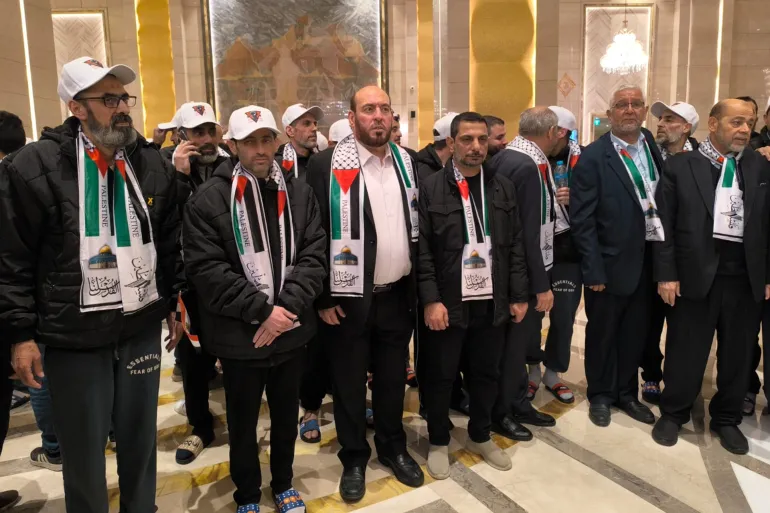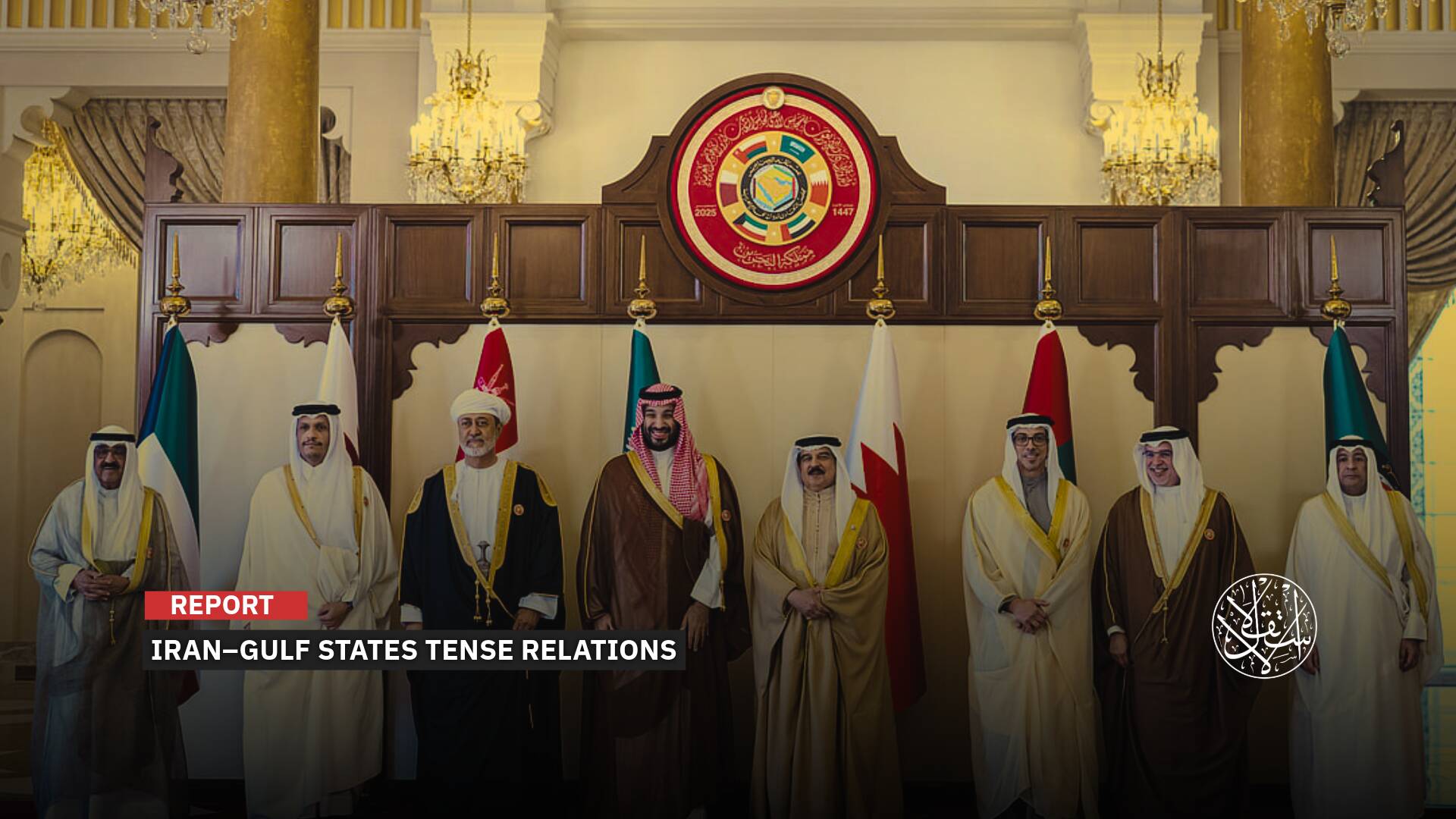Ongoing Struggle: Palestinians Freed from Israeli Occupation’s Chains, Yet Trapped in Exile

Exiled liberated Palestinians were placed in new detention conditions and remained deprived of full freedom.
Following their release from Israeli prisons as part of the "Flood of Freedom" exchange deal, the Palestinian detainees found themselves in a new form of captivity, as soon as they stepped onto Egyptian soil.
Despite their long-awaited freedom, their arrival in Egypt marked the beginning of a different kind of confinement, where they were placed under strict restrictions and surveillance, signaling that the path to full liberation remains elusive.
These detainees, many of whom had spent years behind the bars of Israeli occupation, had long dreamed of the moment of freedom, eagerly awaiting its arrival.
Yet, the reality they encountered upon their release was far from what they had imagined.
Instead of being welcomed as heroes of liberation and provided with the necessary means to rebuild their lives, they found themselves thrust into a new form of confinement.
Their freedom, though technically granted, remained incomplete, suspended in uncertainty, awaiting a future shrouded in ambiguity.

The Story of Exile
In the ceasefire agreement reached in January 2025, which saw the Israeli occupation renege on the second and third phases of the deal, "Israel" released over 1,700 Palestinian prisoners in exchange for 33 Israelis held by resistance groups, including 8 bodies.
This exchange took place during the first phase of the agreement, which lasted 42 days, from January 19 to February 28, 2025.
This phase of the agreement included the release of 274 prisoners serving life sentences, 296 individuals with lengthy sentences, and 41 detainees who had been freed in the 2011 "Shalit Deal" and later re-arrested.
It also encompassed 96 women and 51 children, as well as nearly 1,000 prisoners from the Gaza Strip, detained by the occupation forces during the war, among them two women and 44 children.
Among those released, the occupation authorities forcibly deported 229 prisoners serving life sentences or lengthy terms as a condition of their release.
Of the deported, 20 former detainees arrived in the Gaza Strip, while 17 others were welcomed by Turkiye. Meanwhile, 192 remain in Egypt, awaiting transfer to other countries.
In exchange deals involving the release of prisoners serving life sentences or lengthy terms, the occupation authorities condition their freedom on deportation outside of Palestine, citing the perceived threat they pose to “Israeli security.”
However, some detainees refuse to accept deportation, prompting the Israeli Occupation to replace them with others, as was the case in February 2025.
Israeli Occupation’s military radio reported that six Palestinian detainees, freed in the Gilad Shalit Deal but later re-arrested, were scheduled for release but refused the condition of deportation.
As a result, "Tel Aviv" decided to keep them in custody, releasing other prisoners in their place.
On February 21, the radio clarified that these six detainees—whose names were not disclosed—would remain in prison, with their release postponed in favor of others, due to their refusal to accept deportation.
Jordanian detainee Ammar Huwaitat, sentenced to life imprisonment and 20 years for the 2002 killing of an Israeli settler in Ramallah, also rejected his release on the condition of deportation.
After Jordan refused to accept him, "Tel Aviv" swapped him for another prisoner within the framework of the deal.
The refusal to accept deportation highlights the prisoners' deep awareness of the hardships that await them if they are forced to start new lives in foreign countries.
For them, it means embarking on a new struggle to find shelter, a source of livelihood, and the necessary legal documentation, in addition to the uncertainty of securing the approval of any country willing to receive them.

Exile Conditions
Dozens of Palestinian prisoners released in the first phase of the agreement continue to wait in Egypt for the approval of several Arab and Muslim countries to accept their relocation.
With the exception of Turkiye, many countries have refused to host the freed prisoners, who are unable to return to the occupied Palestinian territories.
In addition to Turkiye, countries such as Egypt, Qatar, Malaysia, Pakistan, Indonesia, Tunisia, and Algeria were expected to host some of the freed prisoners.
However, sources familiar with the conditions of the deported detainees have revealed that they are living in unstable circumstances in Egypt, which has refused to allow them to remain on its soil.
Sources told Al-Estiklal that the freed prisoners are staying at al-Massa Hotel, an investment of the Egyptian military in the New Administrative Capital, where they are only allowed to leave with permits or escorted by security personnel.
The sources also revealed that Egypt has not shouldered any financial burden, with Qatar covering the cost of their stay, amounting to $275 per person per night.
Before the arrival of the freed prisoners, sources had suggested that Egypt had agreed to host only those from the Palestinian National Liberation Movement (Fatah).
However, sources speaking to Al-Estiklal have confirmed that Egypt now refuses to host any of the deported detainees, regardless of their political or organizational affiliations.
The sources stated that Egypt treats the freed prisoners as a ticking time bomb, viewing them as a security threat to the country, and "wants to rid itself of them as quickly as possible, despite promoting its role as a mediator in securing their release."
After their release, Egyptian media outlets aired a video showing the deported prisoners arriving at the Rafah crossing, carrying Egyptian flags. Activists have claimed that Cairo forced them to do so.
Egyptian journalist Youssef al-Domouky stated, “I know of no protocol, nor any lack of dignity or humanity, that would compel Palestinian prisoners—who spent twenty to thirty years in captivity for the sake of Palestine—to be handed Egyptian flags to wave instead of Palestinian ones, with their keffiyehs.”
“They are carrying the flag of the intermediary station—whether Egypt or any other country. What is this humiliating scene? Has the inferiority complex of this decaying, sycophantic, and crumbling regime sunk so low that it has to say, 'I am here' in this manner?” he added on X.
“Their reception was degrading, as if they were Egyptian prisoners during a visit to the ‘Scorpion’ or ‘Badr’ prisons, lined up in a humiliating position. A speck of dust stuck to one of their feet is worth more to God and to the people than all of Egypt filled with these oppressive, complex-ridden tyrants.”
Regarding other countries, Nahed Fakhouri, the media official at the Martyrs and Prisoners Office of Hamas, revealed that "Algeria has expressed a preliminary agreement to host a number of prisoners from a specific faction," although he did not disclose which faction.
However, despite Algeria’s long-standing reputation for its unwavering support of Palestinians, the country has yet to receive any of the freed prisoners, even though considerable time has passed since their release.
As for Tunisia, Fakhouri stated that the country has refused to host any of the freed prisoners. A Tunisian foreign ministry official confirmed to Euronews in February that the ministry was unaware of any arrangements, approvals, or rejections regarding the reception of the deported detainees.
In February 2025, Abdullah al-Zaghari, head of the Palestinian Prisoners’ Club, announced that Turkiye, Qatar, Malaysia, and Pakistan had agreed to host a number of prisoners.
However, neither Malaysia nor Pakistan has received any of the freed prisoners to date, and while Qatar had expressed its readiness to host them, it remains unclear whether any deported detainees have actually arrived.

Abbas Deepens Detainees’ Suffering
In addition to their ongoing suffering, the Palestinian Authority has exacerbated their plight through a lack of attention and even the denial of vital documentation.
No delegation from the Authority has visited the freed detainees to assess their needs, with the responsibility instead falling to representatives of factions abroad, such as Hamas and Islamic Jihad.
Moreover, local sources have revealed that the Palestinian Authority in Ramallah, under Mahmoud Abbas, is obstructing the issuance of passports for dozens of freed detainees who have been deported abroad.
According to sources speaking to the Quds News Network, the prisoners affected are those released in the 2011 Shalit Deal.
Those whose passports have expired are not being renewed, a policy that remains unspoken and hidden from public view.
The sources pointed out that dozens of freed prisoners had sent their passports for renewal, yet there has been no response regarding their requests for months.
Local sources also revealed that, on March 10, the Palestinian Authority dismissed the Palestinian consul in Cairo, Nidaa Barghouti, due to her assistance to the deported prisoners.
Barghouti had served as a crucial link between the deported prisoners in Egypt and the embassy, following their cases and helping facilitate the issuance of passports that the Palestinian Authority had been obstructing, according to the local Shahed website, which broadcasts from the West Bank.
On March 11, 2025, the website reported, "The Authority does not want honest individuals working in its institutions, instead retaining corrupt figures like its ambassador in Cairo, Diab al-Louh."
The anger, it was explained, "has escalated towards al-Louh due to the embassy's negligence and the indifference shown by its staff towards Palestinians who fled Gaza to escape the war, or those injured who sought treatment in Egyptian hospitals."
Finally, Abbas revealed his vision for dealing with the issue of prisoners, amid accusations from the United States and "Israel" that the Palestinian Authority was offering rewards for "violence against Israel" by disbursing financial payments to the families of detainees and Palestinian martyrs.
On February 10, 2025, Abbas issued a decree halting the payment of salaries to the families of Palestinian prisoners held in Israeli prisons, as well as to the relatives of those who have carried out resistance operations.
Local estimates suggest that this move is aimed at improving relations with the administration of U.S. President Donald Trump, whom Abbas is attempting to convince of his suitability to govern Gaza after the war—an idea both Washington and "Tel Aviv" have rejected.
Abbas followed this decision by dismissing Qadura Fares, head of the Palestinian Authority's Prisoners and Released Prisoners Affairs Committee, just a week after Fares opposed the decree, subsequently placing him into retirement.










